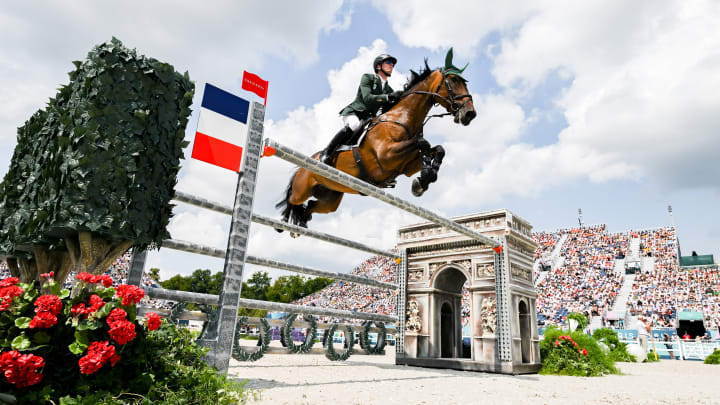Good Luck Topping the 2024 Paris Olympics, Los Angeles

VERSAILLES, France — The 2028 Olympics are four years away but Los Angeles has already lost. How can any city top Paris? Beach volleyball is in the shadow of the Eiffel Tower, fencing is in the magnificent Grand Palais and archery is at Les Invalides. L.A. could hold the swimming in Beyoncé and Jay-Z’s pool and it still wouldn’t measure up.
This year’s equestrian events are being held at the Palace of Versailles, which is fitting, because more than any leader in history, Louis XVI taught us that if you care more about your horses than your people, they’ll kill you. The people, I mean.
Versailles first became a royal residence under Louis XIII, who built a hunting lodge here. Louis XIII’s son, Louis XIV, became the absolute monarch of France at the age of four, making him the rare person to ascend to the throne before he could sit on it. Louis XIV built the palace, not by actually doing the construction or taking a second job to finance it, but more in the sense of saying: “I want that.” Once he had replaced his father’s hunting lodge with a breathtakingly large and stunningly beautiful residence, Louis XIV filled it with brilliant works of art, then spent most of his time there going hunting.
By the time Louis XIV died, there were 700 horses at Versailles, or as his great grandson, Louis XV, would say, “Not enough.” According to the official Palace website, when Louis XV went hunting, “he would change mount several times: four times when hunting stag, three times for boar, twice for deer.” This will be a demonstration event at the next Olympics.
When Louis XV died, there were 1,700 horses in the Great and Small Stables at Versailles. Louis XVI believed that whatever you have, you should have more of it, which explains why they named everyone Louis. By 1787, there were more than 2,200 horses at Versailles.
The next winter was rough, causing a widespread famine. Louis XVI’s official response, “Of course people are starving. It’s the 1700s! What do you expect?” did not sit well with the citizenrēe, and it led to a question that historians have asked for generations: “Is there any way we can blame a woman?”
Enter Marie Antoinette, Louis XVI’s wife. Her purported advice to people who could not afford bread, “Let them eat cake,” made the French even angrier. They dragged Louis XVI and Marie Antoinette out of Versailles, so as not to get blood on the rugs when they beheaded them, and then, in what has to be the most savage bit of trash talk in history, the French went up to the severed heads and said, “Do you hear the people sing? Singing a song of angry men?”
Later, historians concluded that Marie Antoinette probably didn’t actually say “Let them eat cake,” but she still should have smiled more.
History is written by the winners, is what I’m saying, which is why French president Emmanuel Macron and I joined 16,000 other people for Friday’s equestrian jumping team final. It was quite entertaining. To understand how deep the field was: Sweden entered a rider named Henrik von Eckermann on a horse named King Edward and they didn’t even medal. This is why I stopped betting on equestrian.
The beauty of the Olympics is that they are nerve-wracking no matter the sport or your familiarity with it. The crowd here watched in silence, as is the custom, though there were gasps and sighs whenever there was a penalty. It was beautiful and tense, though for U.S. rider McLain Ward, it was mostly tense: “I'm not the guy who does that easily,” Ward said, when he was asked about handling pressure. “I’ve had to work at it.” He seemed to have a steady hand to me, though I admit I am not his horse.
Ward, Laura Kraut and Karl Cook took the silver for the U.S. Great Britain won gold, after which Brit rider Harry Charles gave the most predictable quote in equestrian history: “I still play a lot of golf.” The French took bronze, which is worth celebrating with a fabulous meal in a beautiful location, or as the French would describe it: “Every meal.” L.A. has four years to think of the ways to hype In-N-Out Burger. Good luck.
